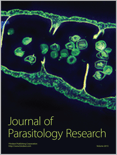
Journal of Parasitology Research
Scope & Guideline
Bridging Theory and Application in Parasitology
Introduction
Aims and Scopes
- Epidemiological Studies:
The journal emphasizes the prevalence and risk factors associated with various parasitic infections in different populations, including human, livestock, and wildlife, often utilizing cross-sectional and case-control study designs. - Molecular and Genetic Research:
A significant focus is on the molecular identification of parasites, understanding their life cycles, and exploring genetic diversity, which aids in developing targeted treatments and vaccines. - Ethnobotanical and Phytochemical Studies:
Research on the use of medicinal plants and their extracts as potential treatments for parasitic infections is prevalent, highlighting traditional knowledge and the search for new anthelmintic and antimalarial agents. - Public Health and One Health Approach:
The journal promotes studies that integrate human, animal, and environmental health, especially regarding zoonotic parasites and their relation to human activities and ecological factors. - Antiparasitic Drug Efficacy and Resistance:
Investigations into the efficacy of existing treatments and the emergence of drug resistance among parasitic populations are key areas of focus, underlining the importance of monitoring and adapting treatment strategies.
Trending and Emerging
- Integration of One Health Approaches:
There is a growing trend toward research that integrates human, animal, and environmental health, particularly studies that explore zoonotic diseases and their transmission dynamics. - In Silico and Bioinformatics Applications:
The use of in silico methods for vaccine candidate analysis and molecular characterization of parasites is on the rise, showcasing the journal's commitment to innovative research methodologies. - Impact of Climate Change on Parasitic Infections:
Emerging studies are focusing on how climate change affects the transmission dynamics of parasitic diseases, highlighting the urgent need to understand these impacts in the context of global health. - Antimicrobial Resistance Studies:
Research addressing the issue of drug resistance in parasites, particularly in relation to treatment failures and the development of new therapeutic strategies, is becoming increasingly prominent. - Nutritional and Socioeconomic Impacts of Parasitic Infections:
There is an emerging focus on the relationship between parasitic infections, nutritional status, and socioeconomic factors, which is crucial for developing effective public health interventions.
Declining or Waning
- Traditional Helminthology:
There seems to be a decline in studies solely focused on traditional helminth infections without integrating modern molecular techniques or public health implications, as the research landscape evolves towards more comprehensive approaches. - Laboratory-Based Studies:
There is a noticeable decrease in purely laboratory-based studies that do not connect to field data or real-world implications, indicating a shift towards more applied research. - Single-Species Focus:
Research focusing on single species of parasites without considering ecological or epidemiological contexts is becoming less common, as there is a growing recognition of the interconnectedness of various parasitic diseases.
Similar Journals

Current Research in Parasitology & Vector-Borne Diseases
Connecting research and impact in vector-borne disease studies.Current Research in Parasitology & Vector-Borne Diseases, published by ELSEVIER, is an influential journal dedicated to advancing the understanding of parasitology and vector-borne diseases. With an ISSN of 2667-114X, this journal is highly esteemed in the field, holding a prestigious Q1 quartile ranking in categories such as Animal Science and Zoology, Insect Science, and Parasitology, as well as a notable Q2 ranking in Virology for 2023. The journal's focus spans a crucial intersection of disciplines, offering a platform for innovative research that directly addresses global health challenges posed by parasites and vectors. Researchers benefit from its robust open-access model, which facilitates unrestricted dissemination of knowledge, making essential findings accessible to a wider audience. The journal continues to play a pivotal role in fostering scholarly dialogue and interdisciplinary collaboration within the scientific community, serving as a vital resource for professionals, students, and academicians interested in the dynamic and evolving field of parasitology.

KOREAN JOURNAL OF PARASITOLOGY
Illuminating the World of Parasites and Their ImpactKorean Journal of Parasitology is a respected publication in the field of parasitology, originating from the esteemed Korean Society of Parasitology and affiliated with Seoul National University College of Medicine. Established in 1977, this journal focuses on disseminating significant research findings related to parasitic diseases, their vectors, and control measures, serving as a vital resource for researchers, medical professionals, and students alike. Although coverage in Scopus has been discontinued as of 2022, the journal remains a valuable platform for in-depth studies within the areas of Infectious Diseases and Immunology. With an ISSN of 0023-4001 and an E-ISSN of 1738-0006, the journal promotes open access to enhance academic sharing. Despite its current Scopus rankings, which place it in the 38th percentile for Infectious Diseases and 37th percentile for Immunology and Microbiology (Parasitology), it continues to contribute to the global discourse on parasitological research, encouraging collaboration and emphasizing the importance of this field in public health.

Emerging Microbes & Infections
Leading the charge in infectious disease innovation.Emerging Microbes & Infections is a premier open access journal, published by Taylor & Francis Ltd since 2012, dedicated to advancing the understanding of microbial infections and their implications in human health. With an impressive Q1 ranking across multiple categories—including Drug Discovery, Epidemiology, Immunology, and Infectious Diseases—this journal is at the forefront of research in the microbiological sciences. Covering a diverse range of topics, it serves as a vital resource for researchers, healthcare professionals, and students alike. The journal's commitment to open access ensures worldwide dissemination of cutting-edge findings, fostering collaboration and innovation in tackling challenges posed by emerging infections. As part of the thriving academic community in the United Kingdom, Emerging Microbes & Infections plays a crucial role in shaping the future of infectious disease research and public health.
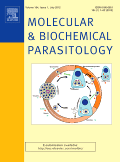
MOLECULAR AND BIOCHEMICAL PARASITOLOGY
Advancing the Science of Parasites at the Molecular Level.MOLECULAR AND BIOCHEMICAL PARASITOLOGY is a renowned journal published by Elsevier, focusing on the crucial intersections of molecular biology and parasitology. Since its inception in 1980, this journal has aimed to advance our understanding of parasitic organisms at the biochemical and molecular levels, providing a dedicated platform for researchers studying host-parasite interactions, parasite genetics, and diagnostic methodologies. Although it currently holds a quartile status of Q4 in Molecular Biology and Q3 in Parasitology for the year 2023, it remains a vital resource within the academic community, boasting a variety of research articles, reviews, and case studies that explore innovative treatment strategies and the molecular biology of parasites. Researchers and students alike can benefit from the journal's contributions to the field, despite its traditional publishing model, as the content remains pivotal for ongoing studies and advancements in parasitology.
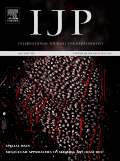
INTERNATIONAL JOURNAL FOR PARASITOLOGY
Illuminating the Path to Understanding Parasitic InfectionsInternational Journal for Parasitology, published by Elsevier Sci Ltd, stands as a premier platform for disseminating groundbreaking research in the fields of parasitology and infectious diseases. With an impressive impact factor represented by its Q1 quartile rankings in both Infectious Diseases and Parasitology for 2023, this journal commands significant attention within the scientific community. Operating since 1971, it has profoundly contributed to the understanding of parasitic infections and their implications for human health, occupying a distinguished position ranked #7 out of 79 in Parasitology and #64 out of 344 in Infectious Diseases according to Scopus metrics. Although the journal currently does not offer open access options, it ensures rigorous peer review and unparalleled academic integrity, providing researchers, professionals, and students with critical insights necessary for advancing knowledge and fostering innovations in parasitology. Together with its rich historical foundation and commitment to excellence, the journal is indispensable for anyone delving into the complexities of parasites and their impact on both host and ecosystem.

REVISTA BRASILEIRA DE PARASITOLOGIA VETERINARIA
Bridging Local Insights with Global Parasitology TrendsThe REVISTA BRASILEIRA DE PARASITOLOGIA VETERINARIA, published by the BRAZILIAN COLLEGE OF VETERINARY PARASITOLOGY, serves as a premier platform for disseminating groundbreaking research and advancements in the field of veterinary parasitology. Since its transition to Open Access in 2007, the journal has significantly contributed to fostering global collaboration and knowledge sharing among researchers and practitioners. Situated in Brazil, this esteemed journal features a diverse range of studies focused on the latest developments and challenges in veterinary and parasitological sciences. With a commendable Q3 ranking in Parasitology and Q2 ranking in Veterinary (miscellaneous) for 2023, it is recognized for its growing impact in the academic community, particularly holding positions in the 60th percentile for General Veterinary and 37th percentile in Parasitology. Researchers, professionals, and students interested in enriching their understanding of veterinary parasitology will find this journal a vital resource, as it bridges regional expertise with global research trends, thus embracing a holistic approach to veterinary health.

ACTA TROPICA
Fostering Innovation in Veterinary and Parasitological StudiesACTA TROPICA is a prestigious academic journal published by Elsevier, dedicated to advancing knowledge in the fields of Infectious Diseases, Insect Science, Parasitology, and Veterinary sciences. With an ISSN of 0001-706X and an E-ISSN of 1873-6254, it has established itself as a vital resource since its inception in 1945. The journal is recognized for its significant impact within the scientific community, boasting a Q2 ranking in Infectious Diseases and Parasitology, and a Q1 ranking in both Insect Science and Veterinary (miscellaneous) categories as of 2023. Specifically, it ranks #19 in Scopus for Parasitology and #129 for Infectious Diseases, underscoring its high visibility and relevance in these vital research arenas. ACTA TROPICA is a non-open access journal, ensuring high-quality peer-reviewed content that complements ongoing research and professional practices among scientists, researchers, and students. Explore groundbreaking studies and contribute to the ongoing dialogue within your field by selecting ACTA TROPICA as your next publication destination.
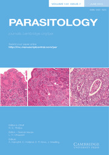
PARASITOLOGY
Unveiling the complexities of host-parasite dynamics.PARASITOLOGY, published by Cambridge University Press, is a prestigious journal that has been at the forefront of research in the field of parasitology since its inception in 1908. This esteemed publication carries the ISSN 0031-1820 and E-ISSN 1469-8161, and its rigorous peer-reviewed articles provide insights into both fundamental and applied aspects of parasitic biology, infectious diseases, and host-parasite interactions. With a commendable impact factor, PARASITOLOGY ranks in the top quartile (Q1) for Animal Science and Zoology and holds Q2 rankings in both Infectious Diseases and Parasitology categories, indicating its significant influence and contribution to these disciplines. The journal's diverse scope allows for a broad range of research articles, reviews, and case studies, making it an essential resource for researchers, professionals, and students seeking to stay updated on the latest developments in the field. Based in the United Kingdom, PARASITOLOGY offers valuable access to critical research in an era where understanding parasitic diseases is more vital than ever, and continues to shape the future of this important scientific field.
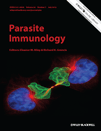
PARASITE IMMUNOLOGY
Exploring the Complexities of Immunological Defense.PARASITE IMMUNOLOGY, published by Wiley, is a leading journal in the field of immunology and parasitology, with an ISSN of 0141-9838 and E-ISSN of 1365-3024. Since its inception in 1979, it has played a pivotal role in advancing our understanding of host-parasite interactions, immunological responses to parasitic infections, and the mechanisms of immunological resistance. The journal is adeptly positioned within the academic community, currently holding a prestigious Q2 ranking in Parasitology and a Q3 ranking in Immunology for 2023, indicating its significant influence and relevance. Its comprehensive scope attracts a diverse readership, contributing to the discourse surrounding novel therapeutic approaches and emerging challenges in parasitic diseases. With a consistent convergence of research until 2024, PARASITE IMMUNOLOGY is an essential resource for researchers, professionals, and students seeking to deepen their knowledge and foster collaboration in these dynamic fields. Although it is not an open-access journal, the insights shared within its pages are invaluable for shaping future research trajectories.

MALARIA JOURNAL
Exploring breakthroughs in malaria research and prevention.MALARIA JOURNAL, published by BMC, is a leading open-access journal dedicated to the advancement of research in the field of malaria and related infectious diseases. Since its inception in 2002, this journal has established itself as a significant resource for the global scientific community, covering a wide range of topics, including epidemiology, pathology, treatment, and prevention strategies for malaria. With an impressive Q1 ranking in both Infectious Diseases and Parasitology categories as of 2023, the journal is committed to fostering high-quality research that contributes to the understanding and control of malaria. As an open-access platform, it ensures that vital findings and insights are freely accessible to researchers, practitioners, and students worldwide, facilitating collaboration and informing public health strategies. The journal's relevance is underscored by its competitive Scopus rankings, which further highlight its impact in the realms of Immunology, Microbiology, and Medicine. Join the community of scholars and practitioners dedicated to combating one of the world's most pressing health challenges.